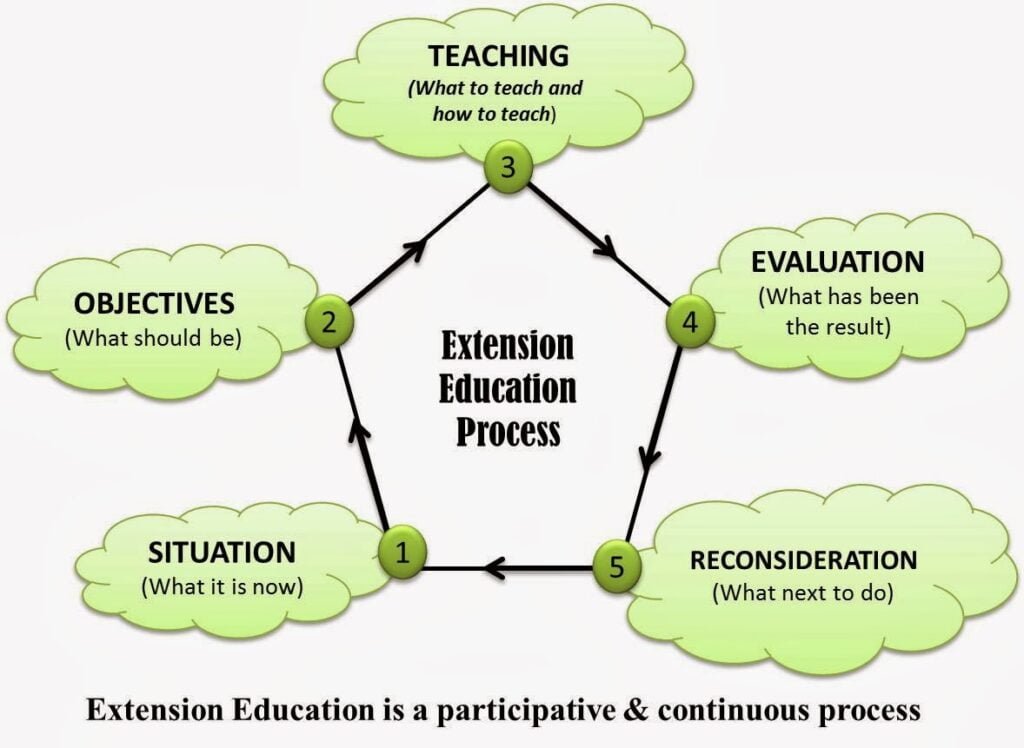Extension education is a type of educational outreach that makes university resources and research available to the general public, with the goal of addressing practical challenges and improving quality of life. It entails the distribution of knowledge by non-formal means such as workshops, seminars, and hands-on activities. It focuses on agriculture, health, and community development, promotes community engagement, lifelong learning, and applying academic findings to real-world situations.
Table of Contents
Meaning of Extension Education
Extension education is an important educational technique that aims to expand learning possibilities beyond regular academic settings. Its primary goal is to offer individuals and communities with access to educational materials and knowledge that may not be easily accessible through traditional means of schooling. This type of education is very important for reaching underserved populations, such as farmers, rural communities, and other groups that require specific information.
Extension education primarily acts as a link between research and practice, ensuring that the most recent results and innovations reach the populations that may benefit the most. Extension education’s theoretical foundation is based on participatory learning concepts and adult education methodologies. This method stresses learners’ active participation, acknowledging that adults contribute valuable experiences and expertise to the learning process. As a result, extension educators commonly use approaches such as seminars, field demonstrations, and group discussions to promote experiential and collaborative learning.

The basic purpose of extension education is to enhance the quality of life for its intended audience. Its goal is to stimulate community development, improve livelihoods, and promote lifelong learning by providing relevant and useful information. Farmers, for example, can profit from extension education programs by learning about new agricultural techniques, pest management, and sustainable farming practices, resulting in increased output and income.
Another important feature of extension education is the emphasis on community development. Programs are frequently designed to meet unique local requirements, such as health education, financial literacy, and environmental conservation. Extension education equips individuals with the required skills and knowledge, allowing communities to solve their own problems and achieve self-sufficiency.
History
The concept of extension education originated in the late nineteenth and early twentieth century, primarily in the United States. Significant historical milestones include:
- 1862: The Morrill Act established land-grant institutions in the United States, allowing states to use federal land to fund higher education in agricultural and mechanical arts.
- 1887: The Hatch Act sponsored agricultural experiment stations affiliated with land-grant colleges to undertake research and distribute findings to the public.
- 1914: The Smith-Lever Act established the Cooperative Extension Service, a cooperation between land-grant colleges and the United States Department of Agriculture (USDA) to disseminate research-based knowledge through extension workers.
These initiatives were designed to address the needs of rural communities by providing access to scientific research and practical knowledge.
Principles
Extension education principles drive its activities and procedures, ensuring that it effectively addresses the needs of the communities it serves. The key principles include:
- Voluntary participation: Extension education programs are open to anybody who wants to join, ensuring inclusivity and accessibility.
- Learner-Centred Approach: Programs are designed to match the learners’ individual needs and interests, promoting active participation and engagement.
- Practical Orientation: Dedicated to offering practical, research-based answers to real-world challenges.
- Flexibility: Adapts to the community’s changing needs and circumstances, maintaining relevance and effectiveness.
- Continuous Improvement: Emphasizes continuous program evaluation and improvement in response to feedback and changing community requirements.
Philosophy
The philosophy of extension education is based on the belief that education should be available to everyone and that knowledge should be used to improve the quality of life for individuals and communities. The key philosophical tenets are:
- Democratization of knowledge: Extension education seeks to bridge the gap between academic research and the general public, ensuring that scientific information serves society as a whole.
- Empowerment: It aims to empower individuals and communities by equipping them with the knowledge and skills they need to face their own challenges and opportunities.
- Collaboration: Emphasizes the value of partnerships and collaboration among educational institutions, government organizations, and communities in achieving common goals.
- Sustainability: Encourages sustainable behaviors and long-term solutions that consider economic, social, and environmental well-being.
Extension education promotes community development, increases agricultural productivity, promotes health and well-being, and drives economic success by disseminating information and new techniques.
Frequently Asked Question(FAQ)
What is extension education?
Extension education is an outreach effort by universities and other organizations to convey information and research to the general public, addressing practical challenges and improving quality of life through non-formal education.
What are the key principles of extension education?
The key principles include voluntary engagement, learner-centeredness, practical orientation, flexibility, and ongoing improvement.
Related Articles

